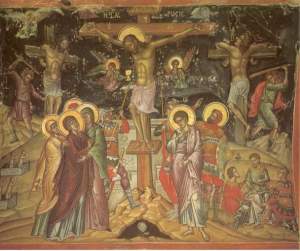
This is my third post on Irenaeus of late, and probably the last for a while. One of the important parts of Irenaeus’ vision of theology is called recapitulation. It is a beautiful theory that I first met in Robert E Webber’s book Ancient-Future Faith: Rethinking Evangelicallism for a Postmodern World (pp. 56ff).
The idea is that the human race by committing evil is tending towards destruction. We have turned from our sustainer and creator and therefore shall all die. God, in a grand rescue plan became a human being like us. In Against the Heresies, he writes:
Therefore, as I have already said, he caused man to become one wiht God. For unless a man had overcome the enemy of man, the enemy would not have been legitimately vanquished. And again: unless God had freely given salvation, we would not now possess it securely. And unless man had been joined to God, he could never have become a partaker of incorruptibility. For it was incumbent upon the Mediator between God and men, by his relationship to both, to bring both to friendship and concord, and present man to God, while he revealed God to man. (3.19.6, in A New Eusebius, p. 119)
For those, like me, who cannot read second-century theology without an eye to the future, will see shades of Athanasius’ On the Incarnation and Gregory of Nazianzus’ famous dictum, ‘What has not been assumed cannot be healed.’ The incarnation, the irruption of God as a man into human history changes the game.
Many people have maintained that Irenaeus’ theology has no place for the Cross, that simply by being incarnate Christ effected our salvation. However, Gustav Aulén, in his class work on the subject Christus Victor, demonstrates that when Irenaeus says incarnation he includes crucifixion, resurrection, and ascension in the bundle. Aulén puts it thus:
Assuredly, then, the death of Christ holds a central place in Irenaeus’ thought. But, we must add at once, it is not the death in isolation; it is the death seen in connection, on the one hand, with the life-work of Christ as a whole, and on the other with the Resurrection and the Ascension; the death irradiated with the ligh tof Easter and Pentecost. (48)
Aulén immediately gives us this footnote:
Some words of Zankow (The Orthodox Eastern Church, p. 55) are as true of Irenaeus, and of the later Greek Fathers, as of Eastern Christianity in general: “Christ’s Resurrection is inseparably connected with His death on the cross. For the Orthodox Church, as well for its theology as for its popular conceptions, salvation is only finally complete in the Resurrection. Sin and death are conquered, and life is bestowed upon men. Only the Resurrection is the real earnest of salvation and of eternal life.” (n. 2, p. 48)
Who does Christ triumph over? Christ is the conqueror of sin and death. And the devil, who is bound up with both. Because of all that transpired in the incarnation, we are set free from the power of sin, death, devil.
And what is the recapitulation bit of this Christ the Victor?
Christ brings us back to what one may call the ‘Adamic’ state. As the second Adam, a concept Irenaeus develops, Christ undoes the evil of Adam. The cosmic effects of the fall as well as the human effects are reversed, and we are able to enter into communion with God through faith in Christ.
Part of the ethical consequences of the cosmic nature of Irenaean recapitulation is our attitude towards the rest of creation. If creation was cursed with us and healed with us, we must treat it well. We are to live now as though we have already come into the Kingdom of the Heavens. This is a good thing, seeking to live in harmony with ‘nature’ (as Zeno the founder of Stoicism once said).
Irenaeus puts it best, and Webber puts it better than I.
I do not believe that recapitulation nullifies other views of the atonement. I believe that it works alongside them and shows different nuances to the wilful sacrifice of God for humanity and how that relates to us and the world around us.
